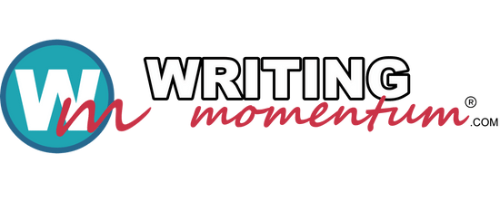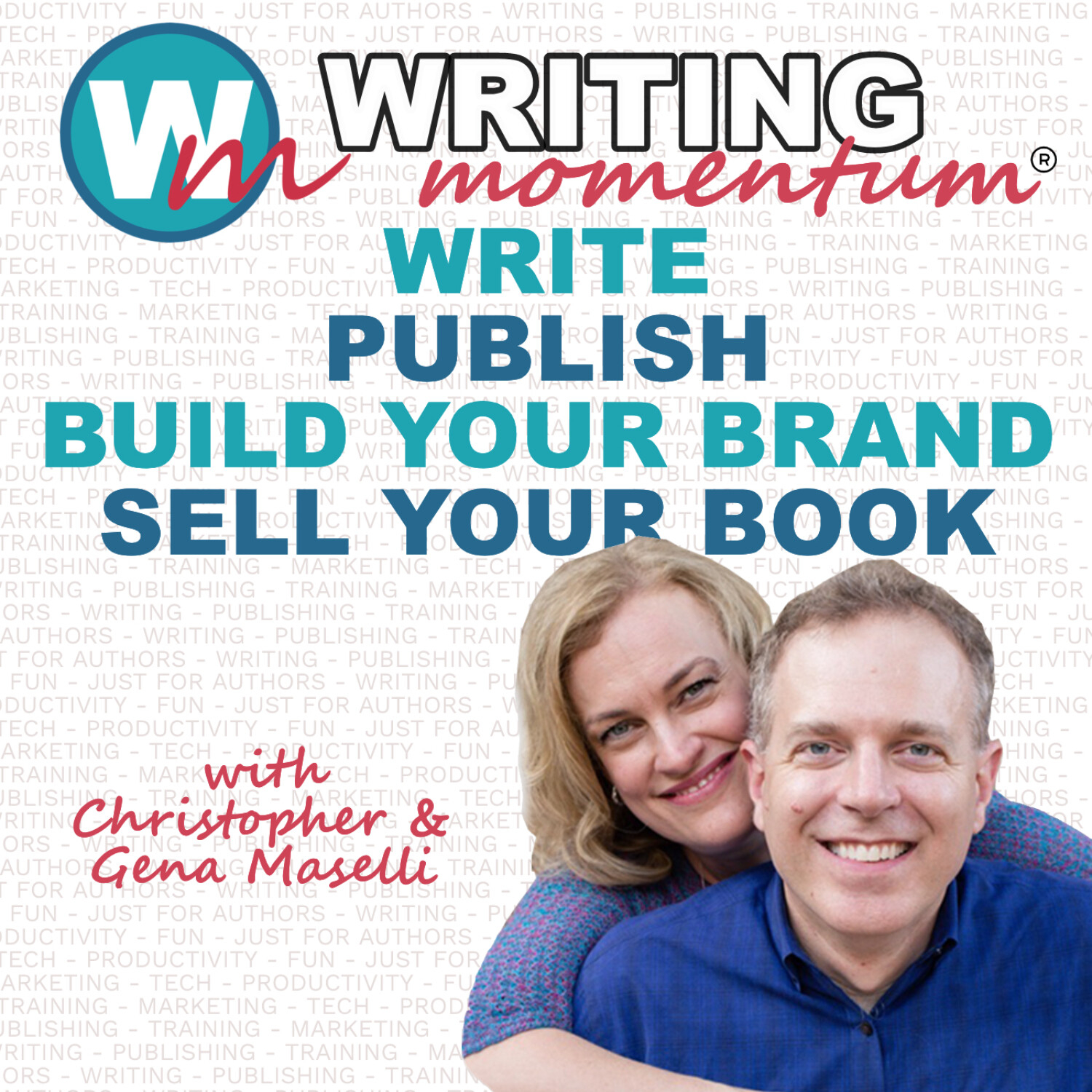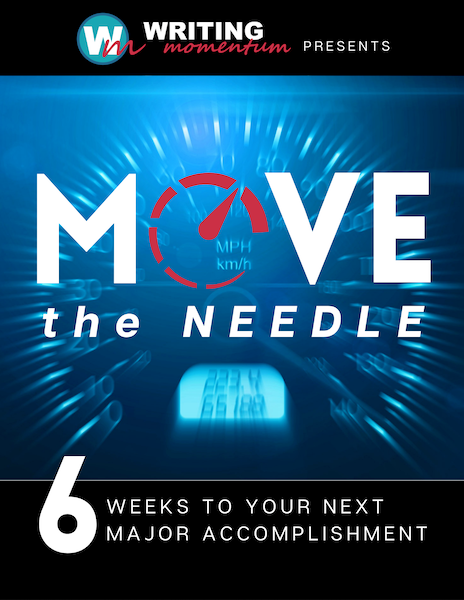Episode 122
7 Essential Book Bonuses Every Author Should Include
In this solo episode of the Writing Momentum podcast, host Christopher Maselli discusses seven valuable bonuses that authors often overlook but should consider including in their books. These bonuses, which range from photos and graphics to pull quotes and real interactions, can significantly enhance the reader's experience and add value to the book. Christopher also highlights the importance of reflection questions and takeaways, especially for nonfiction works. Additionally, he introduces the Writing Momentum membership, offering extensive training and co-writing sessions to help authors stay focused and productive.
- 00:00 Introduction and Podcast Update
- 00:43 Exciting News: Writing Momentum Membership Launch
- 02:45 Seven Essential Book Bonuses Authors Often Miss
- 03:45 Bonus 1: Adding Photo Pages
- 05:01 Bonus 2: Enhancing with Graphics
- 06:51 Bonus 3: Utilizing Pull Quotes
- 08:04 Bonus 4: Sharing Insights
- 10:24 Bonus 5: Creating Real Interactions
- 12:51 Bonus 6: Including Reflection Questions
- 14:08 Bonus 7: Summarizing with Takeaways
- 15:19 Conclusion and Community Invitation
LINKS:
- Liz Wilcox's Email Marketing Membership at http://wmdeal.com/liz
- Get your FREE Move the Needle goal-setting for authors ebook at https://www.writingmomentum.com
- Write with us! Join Chris, Gena, and Rene each Wednesday at noon Central and let's get our writing DONE! https://www.writingmoments.com
Transcript
What pages should authors always include in their book if they
Speaker:can, but they often don't?
Speaker:I can help with that.
Speaker:Hello and welcome to the Writing Momentum podcast.
Speaker:I'm Christopher Maselli and Gena is not here with me today.
Speaker:She is at a conference and so I am here all by my lonesome doing this podcast.
Speaker:For those of you who are viewing on YouTube, I've grown a beard.
Speaker:I am so lonely without Gena here.
Speaker:It's coming in kind of full there.
Speaker:Yeah, so we, she's at a conference and so I am on my own and I thought,
Speaker:you know, I don't want to just wait to record the next podcast.
Speaker:We have so many good things to talk about that I thought we might as
Speaker:well jump into it together this week.
Speaker:Um, it's been quite a full week because we have just fully launched
Speaker:the writing momentum membership.
Speaker:If you're not a part of this, I'm telling you, this is a great time to get in.
Speaker:We have the ability for you to come in and join in every single training
Speaker:that we have created so far that we used to sell individually online is now
Speaker:available as part of the membership.
Speaker:The membership is only 25 dollars a month.
Speaker:It's not much, it's less than a dollar a day.
Speaker:It's less than the cost of a couple Starbucks drinks and you can keep
Speaker:your mind focused on your writing with us because we've got hours
Speaker:and literally hundreds of hours of training that we've put in there.
Speaker:We've categorized it all by topic.
Speaker:Um, we've also got co writing sessions with Gena, myself, and Rene Gutteridge.
Speaker:These are really great times where we get together, and we just have a small
Speaker:training and then we write together.
Speaker:We write on our individual projects together, get some stuff done, right?
Speaker:We've got some round tables coming up with Laurel Thomas.
Speaker:She's joined us to help offer those in there and it's going
Speaker:to be just really great.
Speaker:It's going to be so much that you're going to benefit from that.
Speaker:It's really not much for everything you're getting in every month and it is
Speaker:worth the cost of making sure you get your book done and that you keep your
Speaker:writing on the forefront of your mind because it's you know, it's it's easy to
Speaker:get caught up in the day to day and to think I'm gonna do my stuff and then we
Speaker:don't get it done because we don't have that accountability and As you know, if
Speaker:you've been listening to this podcast for any length of time, you know that,
Speaker:um, statistics show that man, when you have accountability, you have such a
Speaker:higher percentage chance of getting what you're doing done goes up to about 95
Speaker:percent if you have accountability and an appointment scheduled every week.
Speaker:So that's what we've done.
Speaker:We've created something to help us do that, and so far, uh, the people
Speaker:who have joined have been finding themselves getting a lot done, and
Speaker:we'd like to invite you too, so go ahead and go to writingmomentum.
Speaker:com and join with us.
Speaker:But today, we are going to talk about seven bonuses that authors
Speaker:often don't include in their books, but they really should.
Speaker:Uh, you know, when, uh, one of the things that I have been doing for
Speaker:several years as kind of just a side project is I help people format their
Speaker:books and so they'll come to me with their manuscripts and they'll say,
Speaker:Hey, I want to have this formatted for a print book and for an ebook.
Speaker:And so I help them do that.
Speaker:And in doing it, I have discovered there's a lot of pages when
Speaker:authors present their manuscript that just aren't included, right?
Speaker:Everyone always includes, of course, the body of the manuscript.
Speaker:Almost everyone includes a dedication.
Speaker:But there's a lot of other pages that are not included.
Speaker:What I want to talk about today, though, are not just things that aren't included,
Speaker:but some bonuses that really should be included, but often we don't think about.
Speaker:So let me give you an example.
Speaker:So the first one are photo pages.
Speaker:If your book is a book that has any kind of historical value, if you
Speaker:can get some photos in that book, the way that Books are printed now.
Speaker:Even in self publishing, you can make them look quite nice if they're formatted
Speaker:correctly to where those photos just come across very natural in the book.
Speaker:If you're writing an autobiography or a biography, those lend to photos, right?
Speaker:So, try to find photos that can support what you've got in your
Speaker:book and it just adds a little something as people are reading.
Speaker:So many times I have had books that are memoirs or, um, autobiographies
Speaker:that authors bring to me and there's no photos whatsoever.
Speaker:Having those photos just creates an authenticity and an insight that you can't
Speaker:sometimes get through just words alone.
Speaker:So always think about the fact, Hey, I can include photos and how
Speaker:you include them is up to you.
Speaker:You could include them a little bit in each chapter, you know,
Speaker:a couple of each chapter.
Speaker:You could have photo sections in the book.
Speaker:That's fine too.
Speaker:Usually we put captions with the photos, but think about possibly photos if you're
Speaker:writing a book that would work for them.
Speaker:Uh, the next thing is graphics.
Speaker:This kind of goes along with photos, but it's a little bit different
Speaker:because graphics are things that are, uh, illustrations or something
Speaker:that is, uh, uh, graphically created that's in the book.
Speaker:For instance, one of the things I love to do with authors is on the first page
Speaker:of every chapter of their book, and I can do this in both fiction and nonfiction
Speaker:books, I like to take and have a black and white rendering of something that
Speaker:ties in the subject of their book.
Speaker:So let me give you a for instance.
Speaker:Um, I worked with a pastor who was writing about, uh, being on fire for God, right?
Speaker:So he had flames on the front of his book.
Speaker:So I thought, wouldn't it be cool on the first page of every chapter
Speaker:to have black and white flames, like grayscale flames ghosted in the
Speaker:background of that beginning of the chapter page for every single chapter.
Speaker:That means you can thumb through the book and automatically see
Speaker:where the chapters are because it's the pages with the fire on them.
Speaker:And it really set that book apart and set it off.
Speaker:And that's the kind of thing that normally we don't do, right?
Speaker:Most books you pick up, they don't have any kind of graphic elements.
Speaker:Now they do if they're, um, really commercial books.
Speaker:A lot of times the, uh, publishers will include those kinds of elements in them.
Speaker:And so I've noticed that and that's why I like doing that because it really
Speaker:it sets it off It makes it look like you spent more money and more time
Speaker:and more effort in creating the book Even though it's just kind of a visual
Speaker:trick and it just it's a it's a nice Aesthetic something to add to the book.
Speaker:So think about including graphics to set apart the book.
Speaker:You can also include little graphics like where the section breaks are
Speaker:in your chapters Little things like that, little, you know, some graphic
Speaker:that ties into the subject of the book you can put in there, too.
Speaker:Alright, the third thing I like to include are pull quotes.
Speaker:If you're writing a, again this is mostly for non fiction on this one, but if you're
Speaker:writing a non fiction book and you're talking You know, through your pages,
Speaker:it can get a little, um, monotonous, just having page after page of texts.
Speaker:So we'd like to find ways to break that up.
Speaker:One of those ways is by having pull quotes.
Speaker:Pull quotes are literally quotes that are pulled from the text of the book.
Speaker:They're usually in the book near where the actual quote takes place.
Speaker:So we'll find, we'll just go through each chapter and find a couple of
Speaker:pull quotes, things that we like, quotes that really stand out, write
Speaker:sentences that really stand out.
Speaker:We'll turn them into quotes, put them on the page.
Speaker:That is a nice trick to make the book feel like it's a little easier to read.
Speaker:Again, it feels like you put a little more effort in.
Speaker:All it takes is going through and just highlighting some quotes for
Speaker:the person formatting your book.
Speaker:So be thinking, if you're writing a nonfiction book,
Speaker:what could be your pull quotes?
Speaker:I encourage authors to highlight those in the manuscript they send
Speaker:me so that I can find them easily.
Speaker:Something that anyone should be able to do who's formatting your book.
Speaker:So always keep that at the forefront of your mind when you've
Speaker:written that nonfiction book.
Speaker:The next one are insights.
Speaker:This one's a little different.
Speaker:This one came out of a personal experience.
Speaker:I had a friend of mine who was writing a book of poetry.
Speaker:And he ran into two problems.
Speaker:One, he felt like he wanted to make sure his poems were really inspiring
Speaker:to the reader and was hoping that they would come off as inspiring, right?
Speaker:You never know when you're writing them, are other people going to
Speaker:feel that inspiration like I do?
Speaker:But also he had like 75 poems.
Speaker:It wasn't enough to make a very thick book, right?
Speaker:75 poems to 75 pages.
Speaker:That means the book's not even thick enough to have a spine.
Speaker:And so we started brainstorming about it and thought, what could we do?
Speaker:And the idea we came up with was, why not have opposite every poem have
Speaker:a blank page that has just in the center of the page a couple lines
Speaker:about where that poem was inspired from, or what, what was it, you know,
Speaker:that inspired you to write that poem?
Speaker:So he went through the book and he wrote down a couple lines for every
Speaker:single poem in that book, all 75.
Speaker:And we placed those opposite every poem.
Speaker:And what was really great was that as he came out with the book and started
Speaker:to show it to people, one of the points of feedback that he received was how
Speaker:much people liked those points of inspiration that let them see Oh, this
Speaker:is where you got the idea for that poem.
Speaker:It like gave them an insight.
Speaker:And so it made that connection he wanted to make.
Speaker:Not only did it make the connection, but you know what else it did?
Speaker:It made the book twice as long.
Speaker:So it accomplished its purpose.
Speaker:So you can see how these kind of things, all of these are little things, right?
Speaker:They're, they're nothing that would stop you from writing your book
Speaker:or make you have to pause and say, Oh, it's going to take me another
Speaker:month or two to get that book done.
Speaker:Not at all.
Speaker:These are small things.
Speaker:These are easy things to do.
Speaker:You can even do these things when you're having a hard time writing
Speaker:that next chapter, just I'm just stopping and saying, you know what?
Speaker:I'm going to go ahead and, uh, cause I can't quite figure out
Speaker:what to do for the next chapter.
Speaker:I'm going to go back and find a few quotes from the last chapter that can
Speaker:be pull quotes, or I'm going to think of what could be the graphic on this.
Speaker:Or maybe I'm going to go find a photo that could work in this chapter, right?
Speaker:These are, these are not things that would take a lot of time.
Speaker:And so, uh, so I really encourage you to do them cause
Speaker:they're, they're kind of fun.
Speaker:I like listicles like this because it helps us, helps us think of things that
Speaker:we may not have otherwise thought about.
Speaker:Speaking of which, the next one, uh, is something else I also like
Speaker:to do, uh, that I've included this in some of my books, and these
Speaker:are what I call Real Interactions.
Speaker:So, you can do this in both a fiction and non fiction book.
Speaker:I've found it to work out really well in fiction books.
Speaker:And what it is, is it's a way to include something in your book, in your story,
Speaker:that is actually in the real world.
Speaker:So, for instance, in my first book in my laptop series, about a boy who
Speaker:gets a laptop and discovers whatever he types into it actually happens,
Speaker:he and his friends surf on the web for the manufacturer of this laptop.
Speaker:They can make anything happen.
Speaker:And they find out that the manufacturer's, um, uh, name is Wordtronics.
Speaker:Right?
Speaker:Something I made up.
Speaker:Wordtronics.
Speaker:And so they go to wordtronics.
Speaker:com and when they do, they see this registration page.
Speaker:Then they find another hit in their searches and it's a, it's basically a, uh,
Speaker:like a death note that says, Hey, if you found this, I must be dead kind of thing.
Speaker:Right?
Speaker:And so it adds all this drama to the book.
Speaker:Well, what we did is before this book was published commercially, we decided
Speaker:to actually create those pages out on the internet because we knew that there would
Speaker:be some kids who'd be reading this book that would go Huh, I'm going to type that
Speaker:into my phone or I'm going to type that into my computer and see what comes up.
Speaker:And we made it to where the actual pages that they searched for came up.
Speaker:We even made it so that that registration form that I told you about that,
Speaker:um, uh, They can put their name into to register their laptop, right?
Speaker:They're supposed to steal information from them.
Speaker:It's actually filled out by the main character on the page.
Speaker:So it's kind of cool, but that's something that happens in the real
Speaker:world that you see in the real world.
Speaker:That's just pretend that you created in the book and you
Speaker:can do that with websites.
Speaker:You could do that with just other things that people can get ahold of or see.
Speaker:It kind of adds authenticity to the book.
Speaker:If you're writing a nonfiction book, it might be a product that you might
Speaker:want to recommend to let people, Yeah, Know, and point to, and don't forget
Speaker:that if your book is a e book, people can actually click on those links and
Speaker:they can go directly to those pages.
Speaker:The next item that I encourage you to use, this is especially
Speaker:for, um, non fiction books, but it can also be for fiction books.
Speaker:Um, usually this would be at the end of the book in fiction books,
Speaker:but it might be at the end of each chapter in a non fiction book,
Speaker:and that is reflection questions.
Speaker:Questions.
Speaker:You've seen this before, where you're reading a nonfiction book
Speaker:and then at the end of the chapter, it's got these reflection questions.
Speaker:Right?
Speaker:Two or three questions they ask you and you're supposed to fill in the blank.
Speaker:These are not hard to create.
Speaker:These are the kind of things you can write easily after finishing a chapter, but they
Speaker:add so much to the book because you feel like you're now interacting with the book.
Speaker:You're responding to the author.
Speaker:So I always encourage, Authors of nonfiction books to create reflection
Speaker:questions at the end of each chapter.
Speaker:Now, again, if you're writing a fiction book, I've seen authors use these at
Speaker:the end of their fiction book for like, um, uh, book group questions, right?
Speaker:Questions that your book group can ask one another about what's going on
Speaker:in the book and about the character's motivations and, um, that sort of thing.
Speaker:So, um, Think about those things.
Speaker:Why not include them, right?
Speaker:Include those book club pages and include those reflection questions
Speaker:because they add weight to your book.
Speaker:And then finally, the other thing that I like to include, especially if it's
Speaker:a business book or not a business book, sorry, a nonfiction book, are takeaways.
Speaker:So this is very nice when you've gotten multiple points you make
Speaker:in a chapter to at the end of the chapter have a list of takeaways.
Speaker:So that readers can, on subsequent readings, just go to that last
Speaker:page of that chapter and remind themselves what the chapter was about.
Speaker:You'll see this a lot in business books, that's why I said business when
Speaker:I was starting to think of this point.
Speaker:but it also works in just about any other kind of nonfiction book.
Speaker:Um, except for maybe not memoir or biography, right?
Speaker:You probably wouldn't include it there.
Speaker:And this doesn't always work in fiction books at all, but there are certain kinds
Speaker:of books that this works really nice.
Speaker:So think about including those chapter summaries or takeaways.
Speaker:All right.
Speaker:So those are, those are the seven things, photos, graphics, pull quotes,
Speaker:insights, uh, real interactions, Reflection questions and takeaways.
Speaker:If you can think of any other, let me know.
Speaker:I love coming up with stuff like this because it always
Speaker:adds to the value of the book.
Speaker:To me, that's the key.
Speaker:Can you add to the value of the book?
Speaker:And if you can, then this is something really, really good to include.
Speaker:So I'd love to hear if you enjoyed this podcast, please leave a comment below.
Speaker:Please go ahead and rate, review, subscribe, share, all that stuff
Speaker:Now, you know, we're always asking for that because whenever you write
Speaker:a review on something like Apple Podcasts It helps other people find us.
Speaker:That's why we ask that and we want to help other writers.
Speaker:That's really what our heart is And, uh, we know that, um, we love being
Speaker:a part of this writing community and we love that you're a part of it.
Speaker:And we'd like to have other people be a part of it too.
Speaker:Uh, speaking of which, just told you at the beginning of this podcast
Speaker:that we are, membership is now live.
Speaker:If you'd like to join us, we would love to have you just go to writingmomentum.
Speaker:com.
Speaker:Click on the membership.
Speaker:There's just 25 a month.
Speaker:I think you'll find that it's It's a really great community, it's just
Speaker:a small group of us right now, but that's usually how these things
Speaker:start, and uh, it's quite rewarding to get in there and write together.
Speaker:Until next week, I'm Chris reminding you that together, we have writing momentum.
Speaker:Bye bye.





